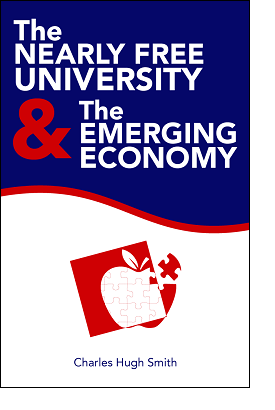Suddenly Useful Eccentrics
In eras of crisis, eccentrics suddenly become useful.
The world is always full of people who are square pegs in a status quo of round holes. These people don't fit into conventional roles, and as a result they are marginalized as failures, geeks, losers, or more charitably as eccentrics: passionate about things that are not valued by the status quo, or good at things that are on the fringes of conventional society.
In stable eras, these marginalized eccentrics often fuel new trends in art and music. Long before he was a world-renowned celebrity painter, Claude Monet was a penniless artist reduced to begging for money from friends to survive, so adamantly eccentric (or if you prefer, so far out of the mainstream) that he refused to study at conventional art academies.
Marginalized by the status quo art world to the point of ridicule, Monet persevered in his vision, along with his friends Renoir et al. There was certainly no guarantee of eventual success; history is replete with artists who died penniless and unknown despite their talent and perseverance.
In eras of crisis, marginalized square pegs may emerge as leaders or as inspirations of new ways of organizing society. As interconnected economic and geopolitical crises reach criticality, those who have been dismissed as has-beens, failures or eccentrics may suddenly become useful.
The gathering storm will open opportunities for all manner of has-beens, rejects, failures and eccentrics, as crisis erodes the status quo's ability to marginalize everyone and everything outside its control. As people realize the status quo cannot provide what it has promised, they become more open to ideas and values that had little leverage or utility in eras of stability and rising prosperity.
In eras of crisis, eccentrics suddenly become useful. Not all eccentrics become useful, but whatever progress is made in resolving the crisis is more likely to arise from eccentrics than intellectually bankrupt conventional leaders of the status quo.
Posts and email responses will be sporadic in October due to family commitments. Thank you for your understanding.
The Nearly Free University and The Emerging Economy:
The Revolution in Higher Education
Reconnecting higher education, livelihoods and the economy

We must thoroughly understand the twin revolutions now fundamentally changing our world: The true cost of higher education and an economy that seems to re-shape itself minute to minute.
Things are falling apart--that is obvious. But why are they falling apart? The reasons are complex and global. Our economy and society have structural problems that cannot be solved by adding debt to debt. We are becoming poorer, not just from financial over-reach, but from fundamental forces that are not easy to identify. We will cover the five core reasons why things are falling apart:
 1. Debt and financialization
1. Debt and financialization2. Crony capitalism
3. Diminishing returns
4. Centralization
5. Technological, financial and demographic changes in our economy
Complex systems weakened by diminishing returns collapse under their own weight and are replaced by systems that are simpler, faster and affordable. If we cling to the old ways, our system will disintegrate. If we want sustainable prosperity rather than collapse, we must embrace a new model that is Decentralized, Adaptive, Transparent and Accountable (DATA).
We are not powerless. Once we accept responsibility, we become powerful.
Kindle: $9.95 print: $24
| Thank you, readers, for your much-appreciated generous contributions to this site-- I am greatly honored by your support and readership. |



























